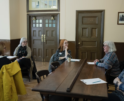
Breast Cancer: Racist?

Though African-American women are less likely to develop breast cancer than white women, they’re more likely to die from it. Here’s why – and how cancer impacts the careers of survivors.
By Taylor Mallory
Glynis Legrand was a 34-year-old, African-American mom with a career on the fast track. She’d garnered five major promotions in a decade working for State Farm. As auto underwriting superintendent, she ran a department with 80 employees and was the point of contact for more than 600 agents. “I planned to retire with that company,” she remembers.
But her world changed in 2001. She found a lump in her breast just months after her last mammogram, which she’d started getting at age 26, having learned that breast cancer takes a bigger toll on African-American women’s lives for reasons ranging from DNA to socioeconomics, racism, fear and a culture of deadly silence. While white women in general are more than 14 percent more likely to get breast cancer, younger African-American women (under age 45) are at the highest risk, and African-American women across the board are nearly 9 percent more likely to die, according to the American Cancer Society.
“I thought I’d have a lumpectomy and work through treatment,” Legrand says. But, thanks to other related illnesses like pneumonia and ovarian complications (both of which emerged the day she tried to go back to work), she was out for nine months.
Legrand, now owner of the successful Urban Tea Loft, wasn’t replaced. But she did hit the “breast cancer ceiling.” When she returned to State Farm, she continued to get projects but not the exposure to top executives she had once had. “When the advancement lists came out, I was no longer on them,” she says. “I can’t say for sure it was about race, but I knew white women on campus with breast cancer who were not treated that way.”
Cynthia Swift King, a compliance officer for Aetna Life & Casualty, had a different experience at work when she was diagnosed with breast cancer for the first time in 1998. “My job was very supportive,” she explains. But after two bouts with breast cancer and one with uterine cancer, King left the company she’d been with more than 25 years. “I was the first woman and first African-American to obtain that position. But after cancer, I just wanted a job where I could help people.”
Many breast cancer survivors, however, don’t leave work on their own terms and instead find themselves quickly unemployed. Breast cancer survivors are 3.9 percent more likely to be unemployed vs. male cancer survivors, whose employment rates do not change, according to the American Medical Association.
While breast cancer is a nightmare for anyone, the impact on the lives (and careers) of African-American women is profound. “Black women are more likely to get it when they’re younger and are in the prime of their lives, are often heads of households, and are more likely to die from it,” explains Marisa Weiss, M.D., a breast cancer oncologist. “And because of the economic downturn, they’re also less likely to get the flexibility they need at work.”
Science, Socioeconomics or Culture?
So why the higher mortality rate among African-American women with breast cancer? “It’s multifactorial,” says Lisa Newman, M.D., a surgical oncologist specializing in ethnicity and breast cancer. “Issues relating to socioeconomics are probably the biggest contributor. But there are cultural issues that play a role and biological issues that have the deck stacked against all African-American women.”
First, African-American women are significantly more likely to develop the disease before age 45, when most women start getting mammograms. They’re also about twice as likely to develop “triplenegative” breast cancer, the most challenging form to treat and the most deadly. “Then there is the very poorly understood fact that African-American women are less likely to be able to complete chemo because of lower white blood cell counts,” Newman explains.
Socioeconomics, most experts agree, can have the biggest impact. African-American women are two to three times more likely to be uninsured or underinsured, Newman points out. This leads to delays in diagnosis (decreasing the likelihood of survival), less comprehensive treatment and follow-up, and less education about breast cancer in the first place.
Finally, there are cultural issues that play a role, the most dangerous being fear, which leads to silence, says Karen Eubanks Jackson, founder and CEO of Sisters Network Inc., the only national breast cancer survivorship organization for African-American women. “Even in 2009, breast cancer is not discussed openly in this community,” Jackson says. “There is shame around being diagnosed, which has to stop, but there is also a tremendous amount of fear. Right now, because of the higher mortality rates and lack of education in the community, there is this notion that breast cancer is an automatic death sentence. And that keeps too many women from getting treatment early enough.”
“One More Strike Against Her”
When the laws changed earlier this year to incorporate breast cancer survivors in remission under the Americans with Disability Act, the number of discrimination claims went up. “African-American breast cancer survivors now have additional protection under equal opportunity laws as a minority, a woman and a previously disabled worker, but there are no longer memos going out saying, ‘Fire that sick black woman,’ so it’s harder to prove,” says Emily Blumenthal, an attorney with Jackson Lewis LLP, an employment law firm.
Still, Jackson believes that breast cancer definitely impacts careers. “Institutionalized racism hasn’t changed enough for African-Americans, especially women, to be treated as equals,” she says. “So breast cancer is just one more strike against them in the workplace, one more hurdle to jump over.”
Some, like Brenda Lauderback, an African-American breast cancer survivor and corporate director for the boards of Big Lots, Denny’s and several others, dispute the effectiveness of making breast cancer a race issue. “It touches everyone,” Lauderback says. “We all have a personal story, and it’s dangerous to put a wedge between women of different races. We’ll only solve this problem if we’re all in it together.”
Few would disagree. But there’s no doubt that disparity still exists when it comes to breast cancer and race. Women everywhere can only hope – and put our dollars where our hearts are – that more research will start to close the racial divide. And with women like Legrand, King, Jackson and Lauderback sharing their breast cancer experiences with anyone who will listen, we’re one step closer to the awareness that will bridge the gap and, one day, kill the disease.
A special thanks to the Susan G. Komen Foundation for their help with this article.
Recommended
-
5 Skin Care Trends: What Profe...April 10th, 2024
-
Is It Time To Change Your Rela...March 20th, 2024
-
Resilience & Transformati...February 20th, 2024
-
Medical Malpractice Lawsuits: ...October 31st, 2023
-
Be Here Now—Two Easy StepsSeptember 19th, 2023















